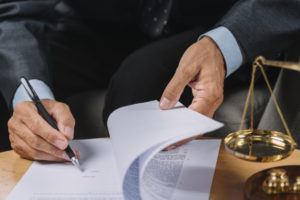Filing for Chapter 7, 11, or 13 bankruptcy triggers an injunction called “automatic stay.” It essentially protects debtors from persistent collection efforts from creditors and other collection agencies. Once an automatic stay is in effect, all debt collection efforts must stop at once. If you filed for bankruptcy, it means that creditors may no longer:
- Contact you through phone call and correspondence.
- File a lawsuit to collect on what you owe.
- Maintain a collection lawsuit.
- Pursue wage garnishment.
- File a lien.
The automatic stay is one of the main motivators to file for bankruptcy. It gives a debtor considerable relief from anxiety and a chance to regroup and organize his or her financial affairs. Of course, there’s also the longed-for fresh start after getting to the debt discharge part of the bankruptcy process.
Benefits of Automatic Stay
 Many debtors face the threat of foreclosure, disconnection of basic services like utilities, and job loss because of wage garnishment. Having an automatic stay in place can prevent utility disconnection for 20 days, as well as stop wage garnishment, provided that it’s not for a high priority debt such as alimony or child support. It can also temporarily halt foreclosure or eviction proceedings, although if your landlord has already secured judgment of possession, it would already be too late even with an automatic stay. Also, if your landlord has officially accused you of endangering the property or being involved in controlled substance use, the automatic stay may be lifted.
Many debtors face the threat of foreclosure, disconnection of basic services like utilities, and job loss because of wage garnishment. Having an automatic stay in place can prevent utility disconnection for 20 days, as well as stop wage garnishment, provided that it’s not for a high priority debt such as alimony or child support. It can also temporarily halt foreclosure or eviction proceedings, although if your landlord has already secured judgment of possession, it would already be too late even with an automatic stay. Also, if your landlord has officially accused you of endangering the property or being involved in controlled substance use, the automatic stay may be lifted.
Although both Bankruptcy Chapter 7 and Chapter 13 have an automatic stay, Chapter 13’s provide better protection if you’re facing foreclosure. It offers more tools for you to be able to keep your home. With a Chapter 7 bankruptcy, a creditor may proceed with the foreclosure if you don’t have an official debt repayment plan or a formal agreement in place.
Unaffected by the Automatic Stay
There are some circumstances in which the automatic stay does not apply. Certain debts simply aren’t dischargeable. If you’re filing for bankruptcy, it’s important to find out which actions and proceedings are not affected by it. Here are some instances:
The automatic stay will not protect you from any lawsuit against you related to establishing, modifying, or collecting child support or alimony.
It cannot prevent the IRS from demanding a tax return and auditing you even if the automatic stay can prevent it from issuing a tax lien or seizing your property.
It will not completely stop criminal proceedings, even in cases involving debt issues. What will happen is that the debt repayment part of the case will simply be separated from the criminal part.
It doesn’t relieve you of repaying loans from many job-related pensions. If they remain unpaid, you may have money withheld from your paycheck despite the automatic stay
Getting the Automatic Stay Lifted
A creditor may file a motion to remove the automatic stay. It’s possible for the landlord to go to court and ask to lift the stay in cases involving tenants who file for bankruptcy just as they are about to be evicted for not paying rent, and they are unable to pay the arrears or rent when it is due. It’s the same for secured creditors. They may ask the bankruptcy court to remove the stay if the debtor filed for bankruptcy just as they were going to repossess collateral because of the debtor’s failure to make loan payments over some time.
Wondering about Bankruptcy Protection? Contact an Oregon Bankruptcy Attorney Today!
If you want to verify what benefits you can get from a bankruptcy filing and just what kind of protection it will give you as a debtor, consult a bankruptcy lawyer right away. For advice and guidance on serious financial problems in Oregon, call us at Northwest Debt Relief Law Firm and speak with one of our bankruptcy attorneys.











